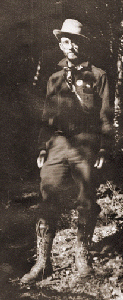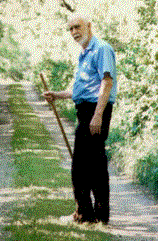
The Joyous Pathfinder: Charles Van Riper
1905-1994
by Albert T. Murphy
Few persons are thought of as "legends in their own time" but Charles Van Riper, who passed away peacefully at his home in Kalamazoo, Michigan, on September 25, 1994, at the age of 88, was such a man.
Born in 1905 in Champion, a small town in Michigan's upper peninsula, the first quarter-century of his life was plagued by profoundly severe stuttering, an impairment which eventually, however, led him to become a pioneering founder of the new profession of speech pathology and the widely-recognized world authority on stuttering. As with many outstanding people, he learned how to use sad circumstances in a creative way and with great impact.
Dr. Van Riper was a prodigious author, with over 200 publications spanning eight decades to his credit. His Speech Correction: Principles and Methods (Prentice-Hall) first appearing in 1939, has been the most popular text in the field, and is now in its 10th edition. Among other books are: The Nature of Stuttering; The Treatment of Stuttering: Your Child's Speech Problems; Voice and Articulation: Teaching Your Child to Talk; Speech in the Elementary Classroom; and American Phonetics.
He was also the Editor of the 14 volume Foundations of Speech Pathology Series (Prentice-Hall) and editor and contributor to many conferences on stuttering sponsored and published by the Stuttering Foundation of America. His basic textbook has been translated into seven languages and there is even a braille version.
His writing facility surfaced while an undergraduate at Northern Michigan College. In an Honors Class the resident poet, Robert Frost, awarded him first prize for his poetry, which was not only published, but was accompanied by a $25.00 prize which his classmate, John Voelker (Robert Traver, author of Anatomy of a Murder) and he used for a spirited celebratory feast.
For his Master's Degree at the University of Michigan, he specialized in Olde English Literature and Elizabethan Ballads, completing a thesis on Burke's Essay on the Sublime and Beautiful.
Such a background, buttressed, of course, by a brilliant and forceful intelligence, resulted in a prose of vigorous clarity. His was a chiseled style, plain but elegant, based on known facts which he knew intimately and which set his mind free for the imaginative use of them. Though he stuttered throughout his life, in his writing he seemed incapable of a graceless phrase. Through his early years were often bitter ones filled with stuttering and silence, he at last got the audience he deserved and he never let go, nor they him.
He received his Doctorate Degree in Clinical Psychology at the University of Iowa, and in 1936 established one of the nation's first speech clinics which he directed until forced by a heart attack in 1967 to relinquish the post. That year he was appointed Distinguished University Professor, a position he held until his retirement in 1976.
Dr. Van Riper was considered a brilliant clinician and teacher. Because of his preference for starting at the foundations of a subject and at the beginnings of professional careers, undergraduate courses were his favorite settings. Students sensed that his creative teaching flowed from a deep sense of subject undistinguishable from his reverent sense of life. He rarely used notes, but rather worked them into his texts. "My own books I know to the point of nausea," he said, "so I do not duplicate their contents. Also, I find their author surprisingly reasonable."
In clinical practice he was broadly eclectic. It bothered him when people referred to "Van Riperian Therapy" for "I've never practiced it". He knew this attitude troubled those who sought "the ultimate word" as he said, "according to St. Van". But it didn't bother him. He knew there was something of value in most approaches.
He inspired and delighted generations of students with his gift for anecdote, his wiry wit and also for his endearing classroom pranks. On a dreary winter's day, he might suddenly leave the building, a pied piper leading the class outside for what he called "The Dance of the Wild Cucumber" or perhaps, in making angels in the snow. He sometimes wondered why the University didn't fire him.
This trait of playfulness never deserted him. "I want to contribute to a spirit of gaiety in the world. You can be effective in your work without losing any of the fun of living." At 80 he ebulliently rose above Kalamazoo in a hot air balloon. At 88 he was still flying kites.
In his youth, to escape the torments of his stuttering, he fled to the deep woods beyond his village. There he found a world that was good; it delighted his senses; it nurtured his dreams; offered him play: hunting, fishing, exploring, the delights of sylvan adventure. Throughout his lifetime, he returned to the northwoods, vacationed for years in an isolated, Thoreau-like cabin, later building a magnificent log-cabin on a more northerly lake shore--his Shangri-La's
In darkness and amid the many shapes
Of joyless daylight; when the fretful stir
Unprofitable, and the fever of the world,
Have hung upon the beatings of my heart_
How oft, in spirit, have I turned to thee,
Oh sylvan Wye! thou wanderer through the woods,
How oft has my spirit turned to thee!"
Wordsworth
Dr. Van Riper was an active farmer, but he delighted more in the profusion of flowers he cultivated. Throughout their long married life, each morning he would place a flower at the table for his beloved wife Katherine ("Milady Katy"), who died in 1984.
In his lifetime, he planted more than 5,000 trees in the belief we all should leave our little bit of earth a better place. One day, repairing a compost shredder, he sheared off his two left middle fingers. "Looking down at the pile of green shreddings, I saw to my surprise some scarlet there and thought it beautiful until I suddenly realized that the color came from my shredded fingers." The next day he spread the bloody compost in his rose garden. He quipped, "The roses that year were never redder. I recycled myself. Not many men have been reincarnated as a rose."
In keeping with his natural philosophy, Dr. Van Riper saw each person as a spring in a deep forest, each a potential small source of a great river of life flowing somewhere safe to sea. He vowed never to pollute his own spring, never to let others dam it up or sully his waters. He wished that others could drink freely of him in order to go to their individual ways refreshed. He took no credit for being a forest spring.
His capacity for courage and merriment in the face of adversity was extraordinary. Once, as an undergraduate, miserable from his stuttering, he tried (not the only time) to commit suicide by jumping into Lake Superior. "I swam back to shore," he recalled, "because the water was too damned cold!" His last three decades were filled with physical woes. He had the first of many heart attacks in 1966; he suffered from diabetic neuropathies, phlebitis and other illnesses. Yet he continued to live fully, writing voluminously, enjoying and giving joy. He made survival a grace rather than a grim necessity. Nothing in his life was lost or wasted. Suffering became an enriching benediction, life itself a shining thing.
Upon his University retirement, he launched an entirely new writing career which embraced his love for and knowledge of the Michigan northwoods and its people, especially those of his youth. He subsequently wrote eight volumes (The Northwoods Reader Series_Avery Color Studios, Marquette), selecting the pen name Cully Gage. Gage was his middle and his mother's maiden name (one of his forebears was the Revolutionary War General Thomas Gage). As a boy he had been called Cully, the Finnish word for Charles being Kalla.
These volumes of almost theatrical and certainly picturesque quality depict life in the old days with his family and a large cast of local characters_clever rogues, rough woodsmen, adventurers, saints and sinners. Initially penned for his children and grandchildren, friends encouraged him to widen distribution, and the first volume came to light in 1979.
With these charming and sometimes salty recollections, Van Riper gained a whole new audience of appreciative fans, further adding to the enormous correspondence he gladly maintained.
Though he was bestowed honors in abundance, he typically shrugged them off or avoided them. "Fame is for fruitflies," he would say. "The life of our universe is measured in billions of light years and our little lives wink out like sparks from a campfire. Nuts to honors." Honors were far less important than seeing one of his flowers bloom, horticulturally or academically.
 "Dr. Van" was kind, courteous, firmly gentle, eminently civilized, earthy, singularly uninterested in overcoming, in making himself predominant. "The potential in any living thing is immense, but to release that potential someone has to intervene...After a bum beginning, I've had a very rewarding life. Love to see the human flowers bloom, and take no credit except for the weeding and fertilizer."
"Dr. Van" was kind, courteous, firmly gentle, eminently civilized, earthy, singularly uninterested in overcoming, in making himself predominant. "The potential in any living thing is immense, but to release that potential someone has to intervene...After a bum beginning, I've had a very rewarding life. Love to see the human flowers bloom, and take no credit except for the weeding and fertilizer."
Even as he was dying, he maintained a soaring spirit and kept writing prodigiously: revising his famous introductory textbook, keeping abreast of his river of correspondence, making extensive journal entries of his illness. He had no fear of death.
He had walked out into many a stormy night and bared his chest like Ajax daring Zeus to hit him with his thunderbolts. He never expected to sit in Heaven enjoying blissful happiness, but he did strive to leave some positive trace of having lived. Certainly he will live on in people's hearts, memories, and gratitude. He once observed, "Man is mortal, but deeds may not be_impossible, but true."
Toward the end he said, "The clay I molded is a far better statue than I ever expected...Now my projects are complete. I did them well. What I need now is peace and serenity. I have lived long enough. Now let me rest and become one with Mother Earth again."
Note: Several months before his death, Dr. Van Riper asked the Stuttering Foundation of America to request that Dr. Albert T. Murphy write his obituary for their newsletter. It was published in the Winter 1994-95 edition and is reprinted here with permission. (JAK)

